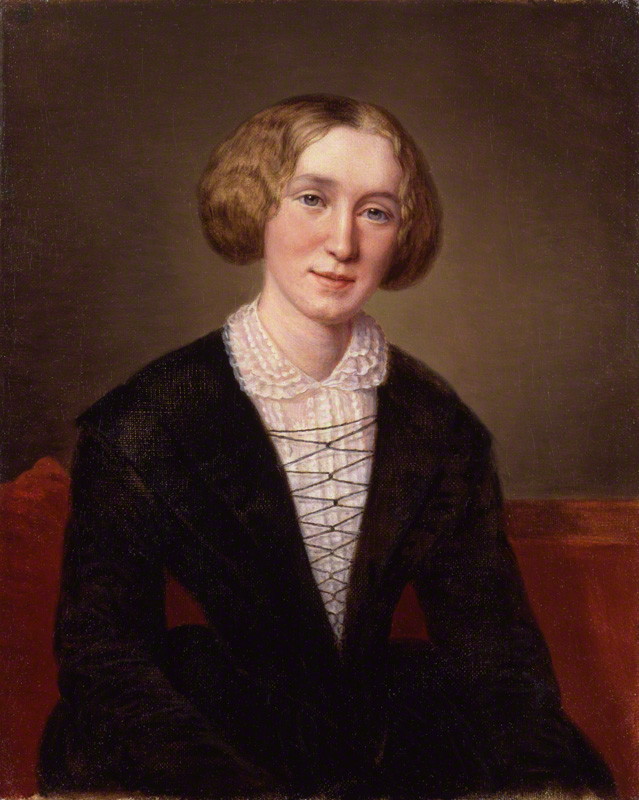George Eliot was the pen name of the celebrated Victorian novelist Mary Ann Evans (1819-1880). She was born on the outskirts of Nuneaton in Warwickshire and was educated at boarding schools from the age of five until she was 16. Her education ended when she was required to come home to nurse her mother and, following her mother's death, to care for her father and to run the family household. In 1841 she moved to Coventry with her father and continued to care for him until he died. Coventry widened her social network and after her father's death in 1849 she travelled to Switzerland with friends and stayed on in Geneva for some months. She then moved to London, where she worked on the Westminster Review, being largely responsible for the magazine's success at that time. In 1851 she met the philosopher, writer and critic George Henry Lewes, who was to become her partner for the next 25 years, until his death in 1878. Lewes was already married but living separately from his wife and unable to obtain a divorce. He and Evans set up home together and faced considerable criticism and social isolation. Mary Ann's brother Isaac refused to acknowledge her or her relationship until Lewes died. Despite these setbacks the couple lived happily; she referred to herself as Marian Lewes and her novels, under her pen name, achieved great acclaim.
Darwin and his family were keen readers of her work and Darwin first called on her and Lewes on 14 November 1868, a Saturday. Some years later he attended on his own one of the Leweses' Sunday afternoons, when they received visitors (23 March 1873; Emma described his visit in a letter to Fanny Allen, [26 March 1873], DAR 219.11: 14). A few days later Darwin asked if his daughter and son-in-law, Henrietta and Richard Litchfield, might call; George Eliot's reply was positive, also encouraging him to call again and bring Emma. In fact, Emma and her younger daughter, Bessy, did call on a Saturday in October 1873 but the Leweses were away. As a result, Emma planned to invite them to lunch but there is no evidence that this happened (Emma Darwin to Horace Darwin, [14 October 1873], DAR 258: 547b). Early the following year the Leweses attended a séance at the home of Erasmus Alvey Darwin, Charles Darwin's older brother (Emma Darwin 1904, 2: 269); Charles was also present but found it too hot and left before the manifestations started (letter to J. D. Hooker, 18 January [1874]). Darwin took Emma to a Sunday afternoon at the Leweses' on 30 April 1876 (Emma Darwin's diary (DAR 242) and Charles Darwin's letter to Francis Darwin, [1 May 1876]). After reading On the Origin of Species, Eliot wrote to a friend, Barbara Bodichon, that the book would have 'great effect in the scientific world, causing a thorough and open discussion of a question about which people hitherto felt timid. So the world gets on step by step towards brave clearness and honesty!' (Haight 1954-78 3: 227).
Haight, Gordon S. 1940. George Eliot & John Chapman: with Chapman's diaries. New Haven: Yale University Press.
Haight, G. 1954-78. George Eliot letters. New Haven: Yale University Press. 9 vols.
DAR items form part of the DAR archive at Cambridge University Library; Emma Darwin's diaries (DAR 242) can be viewed here at Darwin Online.
Litchfield, H. E. ed. 1904. Emma Darwin, wife of Charles Darwin. A century of family letters. Cambridge: Cambridge University Press. (Available at Darwin Online)
ODNB article: https://doi.org/10.1093/ref:odnb/6794
Eliot, George. 1858. Scenes of clerical life. 2 vols. Edinburgh: William Blackwood.
Eliot, George. 1863. Romola. 3 vols. London: Smith, Elder and Co.
Eliot, George. 1859. Adam Bede. 3 vols. Edinburgh: William Blackwood.



